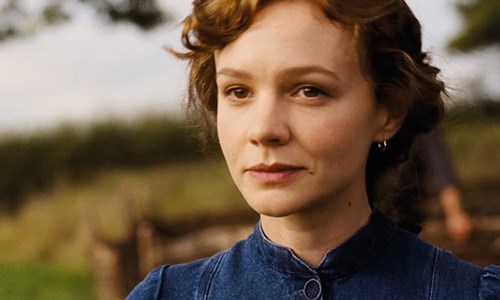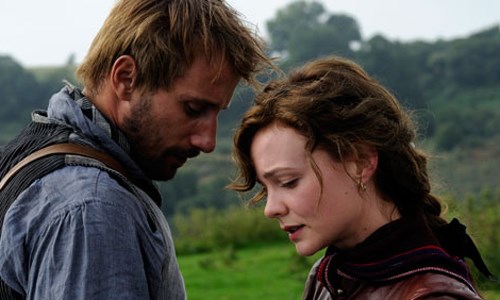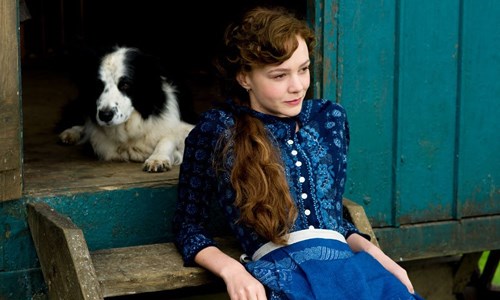Hardy created an epic, sweeping love story for the ages. Strikingly modern even in 2015, the exuberant Victorian farmer Bathsheba Everdene (Carey Mulligan) starts out a simple country girl who has inherited her uncle's farm, and becomes a fierce-willed, impulsive heiress who is faced with a myriad life choices. She's surrounded, and confounded, by intriguing suitors - the down-to-earth farmer Gabriel Oak (Matthias Schoenaerts), the seductive soldier Sergeant Troy (Tom Sturridge) and the wealthy landowner Mr Boldwood (Michael Sheen), but as she weaves through a turbulent tangle of passion, obsession and betrayal, she must etch out her own hard-won path to what she really desires.
Mulligan and Schoenaerts sizzle as the young lovers, with equally brilliant performances from Sturridge as the evil-minded villain, and Sheen as an impassioned man in search of a companion.

The pastoral beauty and sly humour that characterise Bathsheba has kept Hardy's novel one of the most popular of all time. The story has inspired an abundance of stage and film adaptations throughout the years since its publication in 1874 - Bathsheba even inspired The Hunger Games' author Suzanne Collins to name Katniss Everdeen after the Hardy heroine.
The last time this Hardy work was filmed for the screen was for John Schlesinger's 1967 hit starring Julie Christie. In this current adaptation director Vinterberg questioned why Hardy's comically flawed but deeply human characters still ring true 140 years later?
"The answer lies in their still-potent mix of spirited temperaments and dark complexities," says Vinterberg, who set out to be true to Hardy by connecting with the verve, passion and fascination of the feminine strength that seems so immediate in his writing.
"This is a story of fantastic characters created on the page with great depth, movingly integrated into the landscape surrounding them. My approach was to combine that epic grandness with believability - to bring out all the vulnerability and fragility in these characters, while showing all the lavish terrain and drama."

"Far From The Madding Crowd has elements of tragedy, but it also has a tremendous lightness, brightness and romance interspersed with moments of pathos and drama. It combines to give you a real sense of the energy of life," says screenwriter David Nicholls.
Producers Andrew Macdonald and Allon Reich of DNA Films are best known for daring contemporary films - ranging from Danny Boyle's apocalyptic thriller 28 Days Later to the Oscar-winning drama The Last King of Scotland to the haunting drama Never Let Me Go and were passionate about bringing Hardy's story to a new generation.
"We both grew up on the Merchant Ivory films," Macdonald explains, "and we both love those types of stories. Allon knew Far From The Madding Crowd well because he had studied it in school, so we started to look into it. Most people of my generation grew up with the John Schlesinger film, but we thought there was an opportunity to do something quite different."
As they immersed themselves in Thomas Hardy's earthy rural world, they felt the story of Bathsheba Everdene had a chance to strike a deep chord with today's audiences. Its unconventional romance featuring an irreverent woman battling a world that that threatens to quash her hunger for self-fulfilment seemed deeply current.
Says Reich: "Far from the Madding Crowd is Hardy's most uplifting story, although there are tragic moments along the way. We felt we could bring something new to it through a proper, three-dimensional portrait of this wonderful female character whose dilemmas are very contemporary. Not only must Bathsheba decide which partner to choose, but she must also learn how to hold her own in a male-dominated world. She sets out to be seen as a person in her own right, rather than for the status of whomever she marries."
Reich and Macdonald began looking for a writer who could get their hooks into Hardy's very different world of sex, class and social relations in the working-class farm villages of Victorian England and approached acclaimed British novelist and screenwriter David Nicholls. Nicholls had so successfully adapted Hardy's Tess of the D'Urbervilles for the BBC and they were impressed.

Nicholls knew adapting Hardy was no cakewalk, having just been through it, but he simply couldn't resist diving in again. "I've always felt so passionate about the great Hardy novels," he notes. "And unlike Jane Austen or the Brontes, Hardy hasn't been seen on the big screen for a long, long time - so it felt as if the time was right to revisit this terrific story. It's still very much a Victorian novel, but there really isn't another character quite like her, a character so spirited and so stubbornly determined to stay independent. Bathsheba's questions are questions we are still asking: How can a woman stay independent and strong in a world where she's not always given the credit that men are?"
Rereading Far From the Madding Crowd, he came upon a new way into it - structuring everything around the growing bond of friendship between Bathsheba Everdene and the hard-working sheepherder Oak, who remains devoted to her throughout her misadventures, and works his way into her mercurial heart through respect.
"A lot of the drama - and the humour - comes from questions about what makes a good marriage," Nicholls observes. "Is it sex, which draws Bathsheba to Troy? Is it status as she finds with Boldwood? Or is it mutual companionship, trust and friendship, which she has with Gabriel? I wanted to put that question at the centre of the screenplay and focus everything around the growing love story between Bathsheba and Gabriel."
The resulting script was the magnet that captured the heart of Vinterberg, a native of Denmark, has been known in the film world as a rebel and a risk taker who was one of the original founders of the Dogme 95 avant-garde filmmaking movement, and won international acclaim - and the Jury Prize at the Cannes Film Festival - for his explosive film The Celebration, and received an Oscar nomination for The Hunt.
So why did Vinterberg - renowned for excavating the complications of modern lives - want to take on Hardy?
"I like to be on thin ice with my projects; I like to explore new territories," he confesses. "The story is full of fantastic characters and constant reversals of fortune - and that's what makes for great storytelling in any era," he notes.
Though Hardy couldn't be any more English in his literary style, Vinterberg says that, as a Dane, he was drawn to the novelist's focus on the power of fate to shift human lives. "There's a directness to Hardy's way of approaching fate that I found extremely interesting," he explains.
Even more so, he was drawn to Bathsheba. "She is this beautiful, vulnerable creature who I immediately fell in love with. I saw her as this strong woman ahead of her time. One who takes orders from no one, who steps into a man's world with a female power that wasn't really accepted at that time," he says. "And yet, at the same time, Bathsheba was this vulnerable woman trying to learn the rhythms of men and her surroundings. That duality is what makes her so rich and so alluring.
"At first Bathsheba cannot devote herself to Oak or any man, but through this great emotional journey we witness, she gets to the ending that we all yearn for," he muses.
For Macdonald, Vinterberg's psychological approach to Hardy was exhilarating. "He brings a real believability to the story, but he also brings the sumptuous elements of a period epic," he says. "He wanted a film that would feel immediate and stylish, but at the same time have that sweeping sense of epic romance. I don't think we've seen that combination in a while."
Read more about Far From The Madding Crowd and other new films opening this week at www.writingstudio.co.za
